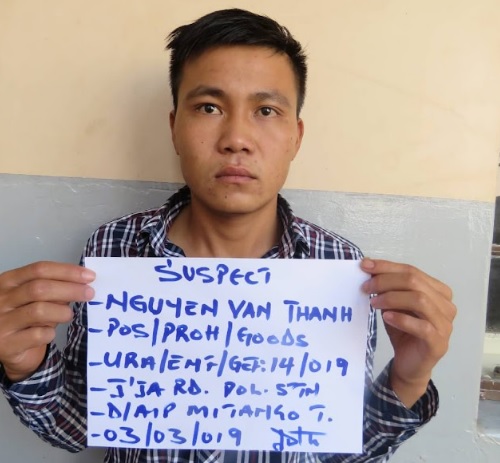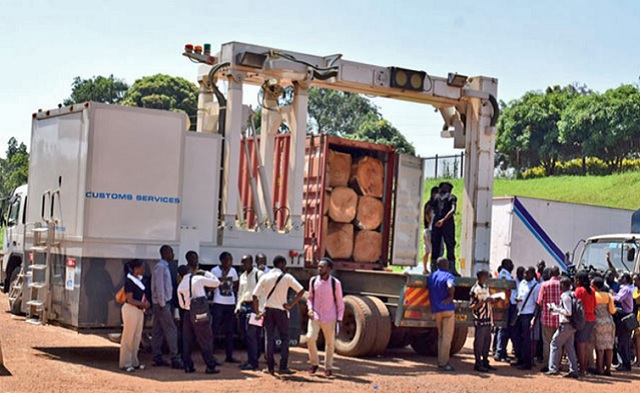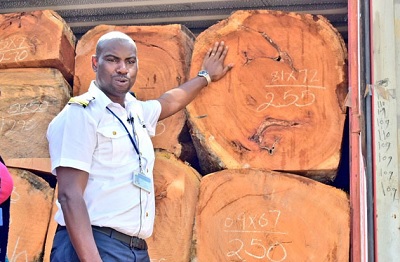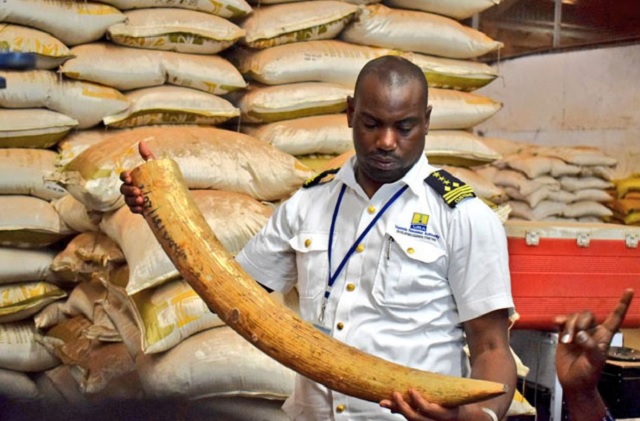

Five years on, Ugandan conservationists can’t believe Vietnamese wildlife traffickers got away with it
SPECIAL REPORT | WILD LIFE CONSERVATION | In January 2019, the arrest and imminent prosecution of several Vietnamese wildlife traffickers in Kampala excited wildlife conservationists in Uganda and abroad who saw it as an opportunity to disrupt a cartel that had been growing and widening in eastern Africa over two decades. But, the conservationists’ excitement soon turned to despair, if not disappointment as they watched the case get smothered and eventually dismissed from Uganda’s Anti-Corruption Court, reports Ronald Musoke.
Five years on, there are more unanswered questions as to why this case collapsed.
Many ask why this case was taken to the Anti-Corruption Court instead of the specialist Standards, Utilities and Wildlife Court. Why is it that even when the Uganda Wildlife Authority (UWA), which alongside the Uganda Revenue Authority (the plaintiffs in the case) objected to the Vietnamese men getting bail, the Anti-Corruption Court Grade One Magistrate, Sarah Namusobya Mutebi, went ahead to grant the suspects bail well-knowing they could flee as they had no permanent residence in Uganda. Some ask why their sureties have never been apprehended.
Criminal Case No.16 of 2019
Over the four months of investigating this case, The Independent has directed these questions to people who work with government agencies which were at the centre of the prosecution of the case which pitted the state of Uganda against the Vietnamese men; Nguyen Son Dong, alongside three others. Some of these questions have been met with either bored or resigned laughter.
Sometimes the questions have been answered back with questions. “That case was dismissed by court; why are you still interested in it?” one official said. Another said simply that they were no longer interested in the case. It is inconceivable that some government officials would struggle to understand that this case involved the killing of at least 300 elephants and 90 Giant pangolins and the contraband was worth millions of dollars.
URA bursts Vietnamese racket
It was towards the end of January 2019 when trucks carrying logs of what was believed to be teak wood from South Sudan via the Elegu One Stop Border Post in northern Uganda moved southwards towards Kampala. Once the logs were delivered northeast of the city at a warehouse near the Mandela National Stadium, they were apparently hollowed and stuffed with ivory and pangolin scales. The contraband is believed to have been collected over time from around the East African region, according to a source familiar with the case.
To the naked human eye, the logs were just pieces of wood, but the Uganda Revenue Authority (URA) customs officials who had been tipped off found illegal contents. They used non-intrusive scanning technology to confirm it was hundreds of elephant tusks and pangolin scales covered in a disguise of sawdust and candle wax.
URA officials immediately arrested two men; Pham Van Chieu, a Vietnamese national, and a one Salim Rama Mwayaga, the driver of a Kenyan registered truck KBN 619X/ZD5984 which was carrying container number: MSKU236961/0 loaded with the logs.

That was on January 24, 2019. The following day, the URA officials arrested another Vietnamese national, Nguyen Son Dong, the Director of Wisdom Theta Limited, a locally registered company under Vietnamese ownership. Nguyen had apparently contacted Embassy Forwarders International Limited to provide a container and transportation for the consignment of goods in the container MSKU236961/0 headed for Mombasa enroute to Vietnam.
At the inland container depot, more work would be done to verify the contents of container no. MSKU236961/0 in the presence of the suspects, police, and UWA, the national wildlife conservation agency. Of the 12 logs found loaded in the container, nine had signs of incision which had been disguised using wood dust.
This time, the logs were cut open and gas flame and gas welding machines and boilers were used to melt the candle wax in order to extract the pangolin scales and ivory. The contraband was then weighed and customs officials would find 423.7kg of pangolin scales and 762 pieces of ivory weighing 3300kg.

On January 30, the URA officials would mount more searches of the residences of the two arrested suspects. In Ntinda (Plot 9, Village II) where Pham Van Chieu lived, two sawmill blades, and a passport belonging to another Vietnamese man (Thai Xuan Tuan) were found.
The officials also found a copy of Memorandum and Articles of a company known as Timber Vietnet Uganda SMS Limited, another Vietnamese-owned company operating in the country; a power saw machine, a digital weighing scale, a woodworking fine band saw, one hacksaw and one used chain saw.
At Nguyen Son Dong’s residence (Plot 7, Bugolobi) in Nakawa Division, the officials recovered a power saw machine, a copy of the Memorandum and Articles of Association of Wisdom Theta Limited, Nguyen Son Dong’s passport and a skull of a red hartebeest.
Following more leads, another search was mounted on Feb.1 at Plot 9, McKenzie View Suites, Kololo, the residence of Phung Thi Lien, Le Thien Luyen, and Bui Thi Dung, where the tax officials found three passports in the residents’ names, an original tenancy agreement between Ssebagala & Sons Electrical Centre and Dinh Van Quan dated April 10, 2018.
An invitation letter to Le Thi Luyen from Hanoi Victoria Investment Limited, an air ticket in the name of Le Thi Luyen, and another air ticket for Phung Thi Lien dated April 4 (2019) were also found. On the same day, the three Vietnamese men were arrested and detained. However, Le Thi Luyen and Bui Thi Dung were given police bond three days later (Feb.4).
More searches were also conducted at timber supply yards at Tirupati Business Park in Kyebando, a suburb in the north of Kampala city. Here, offcuts of cow horns would be recovered in a room rented by a Vietnamese businessman. Following more intelligence, the URA published a notice in the press showing faces of 18 Vietnamese nationals who the tax authority said were linked to ongoing investigations of ivory and pangolin case.
The exhibits gathered from the suspects’ residences and workplaces, alongside the recorded statements and interviews of the suspects were then presented before the Anti-Corruption Court in Kampala on February 07, 2019, to charge the four suspects with possession of prohibited goods contrary to Section 200 of the East African Community Customs Management Act, 2004. They were also charged with “possessing wildlife products without a wildlife use right contrary to Sections 30 and 75 of the Uganda Wildlife Act, Cap 200.”
Shocking court decision?
But in a turn of events that left the conservationists shocked, the Anti-Corruption Court released the Vietnamese suspects on bail the next day, February 08.
It was a development the UWA had dreaded. Communication Manager, Bashir Hangi, had told Uganda Radio Network, a local news agency, that UWA was worried the suspects would jeopardise investigations if released. UWA wanted the suspects to remain in custody so that they are probed further to divulge information on where and how they procured the contraband. UWA also wanted the suspects to be tried in Uganda’s specialised court known as the “Standards, Utilities, and Wildlife Court” for illegal possession of wildlife species contrary to Section 30 of the UWA Act, 2019.
What UWA feared eventually came to pass as the Vietnamese suspects jumped bail and never came back to court. In fact, on March 3, two of the Vietnamese suspects, Nguyen Van Thanh and Dinh Van Chung, were intercepted by URA customs officers stationed at Entebbe International Airport as they attempted to flee the country. But that was the last time the Vietnamese men were heard of.
Five years on, the URA, the Directorate of Citizenship and Immigration Control, and the Office of the Director of Public Prosecutions (ODPP) appear to have moved on as was shown with the attitude towards The Independent when the publication attempted to request for information surrounding the case.
The record of criminal cases such as this is not accessible to the public and one has to rely on the parties involved to provide details. Jacquelyn Okui, the ODPP publicist told The Independent that since the ODPP had delegated the responsibility of prosecution to the URA and UWA, she had no information about the case.
When contacted, a URA officer who would be familiar with the case said all he knew is that the case was dismissed by the Anti-Corruption Court. And, although Simon Peter Mundeyi, the Spokesperson of the Ministry of Internal Affairs under which the Directorate of Citizenship and Immigration Control falls, initially appeared to show interest in finding out the whereabouts of the Vietnamese men, he eventually went silent.
‘We did what we could’
For Bashir Hangi, the Communications Manager at the Uganda Wildlife Authority (UWA), the national agency that is responsible for management of Uganda’s wildlife resources, the disappointment of the outcome of the case still hurts, five years later.
“We did what we could,” Hangi told The Independent. “When a matter is in the courts of law, you do what you can do to the best of your ability and leave the rest to the judicial officers,” he said. “The good judge thought it wise to grant the accused bail.”
But, Leonard Massa, the Deputy Chief Executive Officer of the Natural Resources Conservation Network (NRCN), a Kampala-based NGO, says the Vietnamese men should not have got bail.
“These people have been found to have multiple passports because they are criminals. They should have been denied bail until the conclusion of the case,” he says.
Massa who also doubles as the head of wildlife trafficking-related prosecution at NRCN says in considering whether to give a suspect bail or not, the Ugandan law says court should consider whether the person has a permanent place of residence in the country.
“Does a Vietnamese person who came here to do business in Uganda have a permanent place of aboard in Uganda? The answer is no. So, if court ignored that part of the provision in the law, then that was an error,” Massa told The Independent.
‘Uganda lost big case’
Gladys Kamasanyu, the Chief Magistrate of the Standards, Utilities and Wildlife Court, a specialised court that tries wildlife crimes in Uganda, told The Independent on May 31 that “Uganda lost a big case on so many fronts.” “We lost a case and internationally, this case has painted a not-so-good image of us,” she said, “This was an opportunity to prove our worth.”
She told The Independent that the ivory that was seized is believed to be the biggest volume of ivory ever seized in East Africa in recent times.

Wildlife conservation experts The Independent has talked to say in order to get 3,300kg of ivory (762 pieces of ivory) and more than 423kg of pangolin scales, no less than 300 elephants and 90 Giant African pangolins were killed. In fact, while building their case for prosecution of the Vietnamese wildlife trafficking suspects, the UWA attached an economic value onto the massacred animals to be worth about US$ 12 million.
Tabitha Agaba, the Team Leader at The Initiative Against Illicit Finance, told The Independent that governments like Uganda’s should be concerned about wildlife trafficking because such crimes cut into tourism revenue collection upon which they depend. For instance, in 2022, Uganda earned Shs2.7 trillion from tourism. “This highlights the importance of tourism as a foreign currency earner to the country,” she said.
Uganda is estimated to lose about US$ 590 million (Approx. Shs2.2 trillion) annually in wildlife offences ranging from commercial poaching to hunting for daily subsistence.
Hangi told The Independent that possession of wildlife products without a licence is illegal regardless of the origin of the wildlife products. “UWA implements the Wildlife Act so it does not matter where such products are coming from. We don’t want Uganda to be used as a transit route by wildlife traffickers.”
Vietnamese wildlife trafficking scourge
The London-based non-profit, the Environmental Investigation Agency (EIA), whose work is centred around investigating and campaigning against environmental crime and abuse around the world, says the Ugandan government missed out on disrupting a major Vietnamese wildlife crime network.
The EIA noted in a brief on the case that the narrow scope of the investigation, limited cooperation between Uganda and Vietnam, and the protracted progress of the court proceedings resulted in a missed opportunity to identify and disrupt the wider Vietnamese syndicate thought to be working in the Great Lakes region of Africa.
According to the EIA, Uganda is one of seven African countries where Vietnamese wildlife criminals have established trafficking networks. The others are Angola, Cameroon, the Democratic Republic of Congo, Mozambique, Nigeria and South Africa.
In a report on the role of Vietnamese criminal gangs in wildlife trafficking published in November 2021, the EIA notes how over the last 15 years, Vietnam has gained notoriety for being the primary destination for illegal wildlife products sourced from across Africa and shipped by criminal networks directly or indirectly to meet the demand in Vietnam and beyond.
The report focuses on the impunity with which Vietnamese criminal groups operate in Africa to traffic wildlife and other natural resources from the continent to Vietnam. While a number of commitments have been made by the Vietnamese government to stem the flow of illegal wildlife into the country, many of these promises have yet to materialise.
Under the Convention on International Trade in Endangered Species of Wild Fauna and Flora (CITES), Vietnam has been recognised as a country of major concern due to its role as a source, transit, and consumer country in the illegal trade.
In August, 2019, at the CITES conference of the parties, Vietnam was identified as the leading destination for illicit ivory, surpassing China (including Hong Kong).
“These networks are accelerating the decline of Africa’s biodiversity and are exacerbating corruption and weak rule of law in many source and transit countries in Africa,” the report notes. Many of these countries, the report notes, are grappling with unsustainable levels of poaching and are already bearing the brunt of high levels of other forms of organised crimes, insecurity and corruption.
In fact, since 2010, there have been at least 120 wildlife seizures made at air and seaports in Vietnam involving elephant, pangolin and rhino horn. According to the report, at least 51% of these shipments originated from Africa and a significant number were high volume.
The report notes that large scale seizures at seaports amounted to more than 15 tonnes of ivory and 36 tonnes of pangolin scales since 2018 but not one of these seaport cases has resulted in arrests or convictions.
Vietnam’s transnational organised crime group
The EIA has been studying a Vietnamese transnational organised crime group and says it begun its operations in the late 2000s with Maputo, the Mozambican capital, as its primary base before extending its tentacles to the Mozambican port of Beira.
It later moved northwards to Kampala in Uganda and Lagos in Nigeria. More bases were also established in Angola, DR Congo, Liberia, Madagascar, South Africa, Tanzania and Zambia. The group is also said to exercise significant control of the wildlife trafficking chain from Cambodia via Vietnam to China.
The group is said to have a flexible structure in which its core membership is predominantly based on familial relationships supported by a fleet of workers. The syndicate’s structure displays elements of a rigid hierarchy (a single leader with strong internal discipline with several tiers/divisions) and devolved hierarchy (regional structures, each with its own hierarchy and degree of autonomy). Both are characteristics of transnational organised groups.
In Uganda, this group is said to work with suppliers who source ivory from DR Congo, Zambia and South Sudan for transportation to Kampala. In 2017, it is believed that the group owned close to 3000kg of ivory stored in a location in Kampala. The group’s suppliers in Uganda are mostly West African nationals who can also supply this group with timber from South Sudan and concealment fillers, such as end-of-use batteries.
Massa of the NRCN told The Independent that Uganda has become attractive for the Vietnamese because it is very hard for the Vietnamese to be identified as wrongdoers here. “When they are here, they don’t do their illegal businesses directly and openly. They do their business through local agents and they are always distant from the contraband.”
He adds that since corruption is deeply embedded in Uganda’s economy, Ugandans are used effectively to corrupt the system all along the route to sort the movement of the contraband. “The Vietnamese have discovered that corruption works for them here in Uganda,” he says.
“But, they also don’t fear punitive measures that are in Uganda’s legal system. Even with this new legislation (the Uganda Wildlife Act, 2019), they have good lawyers who they hire to explain to them the law as it is; the penalties and the possibilities to be given lenient sentences.”
Vietnamese ivory market
According to wildlife campaigners in Vietnam, the biggest obstacles to halting ivory trafficking in the country is the lack of in-depth investigations and the lack of port investigations resulting in arrests and prosecutions.
Douglas Hendrie, a wildlife crime expert who currently works as the Director of Counter wildlife Trafficking for the ENV Wildlife Conservation Trust in Hanoi, Vietnam, says although in the last five years there has been growth in the Vietnamese ivory market, raw ivory which comes through Vietnam are often destined for the Chinese market thanks to Vietnam’s proximity to China.
Interestingly, Hendrie who has worked in Vietnam for the last 28 years, thinks the Vietnamese government has performed relatively better than many of its peers in East Asia when it comes to countering wildlife trafficking.
“I would like to highlight the fact that Vietnam is actually a success story. Even though you look at the shipment of ivory coming in, I find it remarkable that Vietnam has made so much progress in such a short period of time to counter wildlife trafficking.”
Hendrie points to prosecution and imprisonment of kingpins. “We are not talking about drivers and mules at low level or operations people. We are talking about people who run networks.”
He says Vietnam has investigated, arrested, prosecuted and imprisoned five wildlife trafficking kingpins. “We have a prosecution rate that is extremely good in Vietnam, with the average prison sentence being at least three years,” he says, “The justice system has responded well and the enforcement agencies have also responded well.”
In Vietnam, ivory seizures in recent years have concentrated in the northern region of Vietnam, mostly at the seaports in Hai Phong.
During the first three months of 2023, customs officials seized over 8 tonnes of ivory at Hai Phong ports. All of the ivory originated from African countries, including Angola and Nigeria. In early April this year, Hai Phong port seized nearly 1.6 tonnes of ivory from a business with an address in Nigeria.
Still, Hendrie says there are still challenges when it comes to investigating major port seizures. “If Vietnam is going to stop the ivory trade, it is important to get the guy who doesn’t touch ivory, who is at the very top of the ivory trafficking in Vietnam. Unless you go for that guy, it is pretty hard to have an impact on ivory trafficking,” says Hendrie.
But Nguyen Van Tri Tin, the Wildlife Practice Lead at World Wide Fund For Nature (WWF) Vietnam says although Vietnamese law completely banned the transportation, consumption, and use of ivory since 2013, checking every shipment is impossible due to the large volume of freight (thousands of containers per day) going in and out of seaports.
He says going forward, African countries must learn to take drastic and timely actions. He mentions the promotion of diplomatic agencies in exchanging information, signing mutual legal assistance treaties with other countries to investigate and trace international wildlife crimes, and arresting and handling the leaders of illegal trade lines.
Corruption or incompetence?
Back home in Uganda, while others have blamed incompetence in Uganda’s judiciary when it comes to prosecuting wildlife crime, others have pointed to corruption. An international environmental crime expert who has worked in Uganda for many years told The Independent recently that it appears it is a mixture of both.
“The lack of care and importance given to environmental crime, and the gap in understanding how wildlife trafficking is linked to financial crime, even human rights abuses, is too big,” the source said.
The Deputy Executive Director of the Advocates Coalition for Development and Environment (ACODE), a Kampala-based public policy think tank, Onesmus Mugyenyi, also blamed poor investigation for the release of suspects.
“Quite often courts are blamed for releasing suspects owing to corruption but you find that these cases are usually ‘killed’ through investigations,” he said, adding that, “Judicial officials are supposed to determine cases before them based on the law and the evidence that has been presented before them.”
Still, according to the Basel Institute on Governance, corruption creates significant challenges in Uganda including within government institutions charged with protecting wildlife, and by political and economic elites in these countries, including ivory stock thefts, and various judicial failings such as ordering the release of seized ivory or suspects on bail or imposing mediocre penalties.
As such, according to its report published in July 2019, Uganda has been identified as a “trafficking hotspot”. When Uganda’s Financial Intelligence Authority (FIA) assessed them for the first time in 2023, it also noted the scourge of corruption in handling forestry and wildlife crimes although they were deemed as “medium risk.” The report mentions poaching as one of the major threats to wildlife as Uganda is both a transit route and a source country for wildlife and wildlife products which are exported to the East Asian market, especially China, Malaysia, Vietnam, and Singapore.
According to the report, between 2017 and 2021, close to 840 people involved in wildlife crimes were reported and 744 arrests were made but of all the arrests, 579 illegal wildlife trade suspects were prosecuted (77.7%). Of the total number that were prosecuted, 313 people were convicted, resulting in a conviction rate of just 37%.
The report further notes that in terms of monetary value, the offences committed were to the tune of about US$ 8.5 million out of which US$ 8 million was recovered in seizures, which translated into a 95% recovery rate.
However, FIA noted in its report that the number of cases reported account for only a third of the cases related to wildlife crimes, and the country is estimated to be losing three times more than the value provided. “This may have a huge impact on tourism and related services and the associated revenues lost therein,” the report reads in part.
Chief Magistrate Kamasanyu of the Utilities, Standards and Wildlife Court says, going forward, the case involving the Vietnamese ivory and pangolin traffickers should be a “wake up call.” “It is one of those cases that wakes us up to know how serious wildlife trafficking is and to not take these cases lightly, at whichever level these cases are,” she says.
“I want to think that this case did not just happen by luck; that the Vietnamese men were just arrested. I want to think they took some time gathering intelligence and following the suspects; so money and time were spent, people risked their lives. It is important to value other stakeholders’ time and resources by doing the right thing; by acting appropriately and not watering-down the efforts of other stakeholders.”
Kamasanyu told The Independent that had there been an arrangement on cooperation on extradition of criminals between Uganda and Vietnam, it would have been probably easier to extradite the Vietnamese men back to Uganda. “I am not sure of what’s being done now to arrest them but, hope of having the accused persons come (back) to court are minimal.”
***
This story was produced in partnership with InfoNile with funding from the Earth Journalism Network. A journalist from Vietnam who requested anonymity to protect their safety contributed reporting from East Asia.
 The Independent Uganda: You get the Truth we Pay the Price
The Independent Uganda: You get the Truth we Pay the Price




Hm. Uganda a joke.
We have no seriousness about anything in Uganda.
We have become like a public toilet… any person from anywhere can come and put any coin in someone’s hand and then they can do anything and everything they want in our country for as long as they want, as many times as they want, and they always get away with it every single time… just because of that coin that they have put in that person’s hand.
No matter how many tough laws we have, here in Uganda there is no seriousness at all… none.
As Ugandans we have been brought to the point where we just have to accept corruption as a fact of life and we just continue managing somehow in the shadows of imposed and enforced foolishness… and there’s no escape, it’s everywhere in Uganda. We have been left with no choice but to just watch as corruption continues turning Uganda into a big joke.
Many have even decided that, “If you can’t beat them, join them.”
We have become completely unable to take ourselves seriously as Ugandans. Michezo just.
Maybe 2024 is the year that we will finally begin pulling ourselves together and we start taking ourselves seriously. Recently we have been seeing some signs of hope, even though most of us have learned to fear hope, there are some few signs of hope. We have become used to short lived efforts, brief campaigns, shallow approaches and such. Maybe this time things will be different… maybe. This is why we fear hope.
*Uganda is a joke.